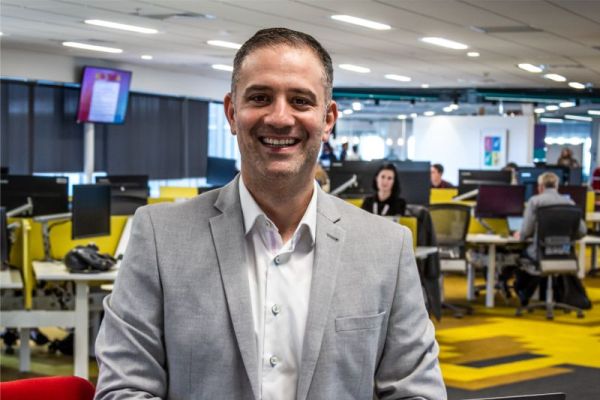Published on the 16/03/2022 | Written by Heather Wright

Vodafone CIO gains recognition with metrics, ERP success and big builds…
When Andrew Haddad took on the role of CIO at Vodafone New Zealand 2.5 years ago, he was tasked with two key things: Creating stability first, then agility.
The telco had just been sold to Infratil and Brookfield Asset Management in a $3.4 billion deal, and Haddad, who this week was named New Zealand CIO of the Year 2021, is blunt: There had been ‘limited’ investment in the IT systems in the lead up to the sale.
“When I came in there was a fair amount of work just to get our systems performing and operating for our customers. We were having more outages and incidents than we would like.”
“CX and operational excellence go hand in hand for me.”
With his background in transformation and change management, Haddad focused on operational discipline.
Measuring metrics was a key part of that.
“We put in place a program to make sure our processes were clearly documented and defined and that all of the leading metrics and the lagging metrics were identified, were being measured and that someone in the team was accountable for the performance of them.
“The purpose of that was just to ensure we were focusing on those things, as opposed to focusing too much on all the new shiny stuff we were also working on.”
A metrics library of 140 metrics, to be tracked monthly, was built to provide insight into how the IT business was running.
“It allows me to reprioritise, make decisions, but it also gave the team structure. When you think about the cascade of accountabilities – what’s my role and how does it link to what we’re doing and what’s important? – it actually made it really easy for people to start to align and see how the work they are doing, even deep within the IT team, linked up with the metrics that matter.”
The plan saw operational performance soar, from having close to 50 major outages a month, to under five.
Two years down the track, Haddad says they’re getting sharper on the metrics that matter and will help the business not just stabilise, but focus on agility, innovation and customer and staff experience.
“The metrics evolve all the time, and I don’t waste my team’s time measuring stuff that isn’t important anymore.”
No separation anxiety
Vodafone is nearing the end of its separation from Vodafone Group, from a systems and technology perspective.
A major ERP separation was completed a couple of weeks ago, and Haddad says separation of end-user technology, including the Microsoft Office suite and email, and security, will be completed by the end of July all separation will be completed.
It’s the ERP program Haddad is most proud of. He says it was an ‘amazing’ program which has been ‘a raging success, frankly, in terms of getting it done in the time frame’.
And it was a tight time frame – just nine months from go to whoa.
The company hasn’t been adventurous, moving from SAP to, well, SAP. But the implementation was significant in size and scope, covering finance, supply chain, procurement and HR.
“There was plenty of risk along the way, there were plenty of issues. We have got plenty to clean up, but miraculously we have actually managed to put this thing into production,” he says, noting “We are wrapping it in cotton wool in terms of support.”
He attributes the success of the program to an ‘excellent program director’ and getting the 101 disciplines right. The business quickly settled on priorities of time, quality and cost – in that order – enabling it to cut through decisions quickly.
“It helped the team not spin their wheels, and just cut through things they needed to.
“And the other thing that helped is that the beauty of an ERP program is the business processes should be relatively straightforward.
“An ERP for a telco is not a strategic platform. It is not a differentiator for us in market, we don’t use it for customer experience, ordering or selling. All that happens in a different set of tools for us. So it was just about trying to keep it as simple as possible.
“But we started with process first: We said these are the processes we’re changing, these are the systems that are currently used in those processes and these are the new systems that are going to play a role in these processes. And our program director was just fantastic at keeping focused.”
Haddad is looking forward to making improvements, modifying it and starting to make some processes more efficient – something the local business had little opportunity to do when it was one of more than 30 operations globally using Vodafone Group’s ERP.
Transformation, CX and operational excellence
Vodafone NZ is now, Haddad says, in a transformation phase.
“We have a number of really big programs underway at the moment. Now I’ve been able to stabilise the ecosystem, my focus is very much shifted on my delivery excellence and making sure I’m demonstrating productivity: That when something comes into my business we can get it through quickly and seamlessly and actually deliver the outcome the business is after.”
There’s plenty happening on the customer side, with Vodafone ‘really changing the digital layer’.
It’s putting in technologies like AWS Connect to help customers contacting the telco, and Service Now to help service and support a customer ticket through the business, extracting insights on where things are going wrong operationally.
Web and app offerings are also getting an overhaul.
“CX and operational excellence go hand in hand for me.
“What I’m trying to drive is we have processes, tools and activities that are performed by our staff within our business operation and for me good CX is around extending those tools and that control and visibility to the end user and putting that in an app or website or whatever channel they chose to come into us through.
“And then that gives them control to be able to move house, address, change Sim cards, change their bandwidth or their plan without needing to engage with us. That gives them control, visibility. In order for us to do that we need to give them accurate and timely data.”
Extending operational activities, tasks and tools and putting them in the hands of the end user drives improved customer experience but it also drives operational efficiency and cost saving for Vodafone, he notes.
A ways of working program, Mahi Tahi, is also underway, building cross-functional teams between dev and ops teams and the business to increase nimbleness, agility and flexibility.
Landing zones in Microsoft Azure and AWS cloud have been stood up and Vodafone’s team are being trained on the cloud environments to give engineers and developers confidence to manage their own infrastructure as code.
Vodafone’s architecture is also changing to be more microservices and API driven. A new deal with SalesForce for Mulesoft will see the company move from five or six different integration platforms to Mulesoft for integration as a platform.
The entire team is also being trained on Azure DevOps in a move Haddad says will help manage the software development lifecycle end-to-end, providing automation and true visibility and ‘hopefully’ starting to automate all the metrics his team currently pull together in spreadsheets.
The big problem
Like most CIOs, Haddad has a wary eye on the big challenge worrying so many businesses: Access to talent.
“The technology will work one way or another. There are plenty more technologies we are buying in and using, but at the end of the day those things will work whether I’m here or there’s someone else.
“My biggest challenge has got to be around talent. I have got to keep the team I’ve got, I’ve got to develop the team I’ve got.”
He’s got a ‘very big’ training program running, training his team – he’s got around 150 in house staff, plus contractors and partners for a team of around 700 – on everything from Agile fundamentals to tooling to specific technologies to technologies they themselves are interested in ‘because if I don’t do it they could potentially just leave me’.
On the recruitment side, he’s looking at working with universities and is also keen to harness skills from across the wider Vodafone business.
“One thing we probably don’t do well enough is just look internally, look left and right into some of the other departments and people who are wanting to have a go at working in IT or maybe having a go at something different for a period of time in secondments.”
That strong team culture Haddad has worked hard to build will no doubt pay dividends.



























